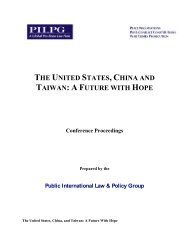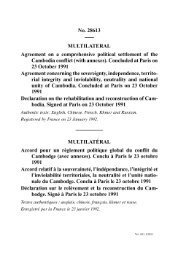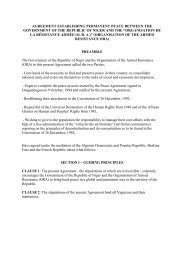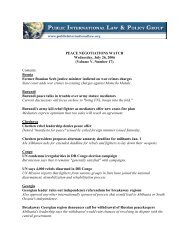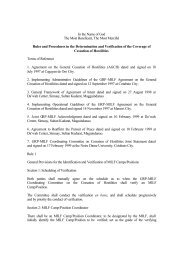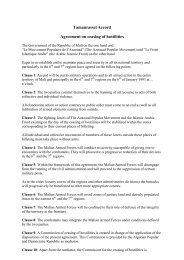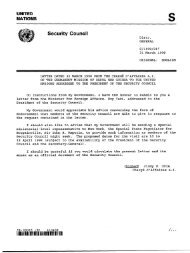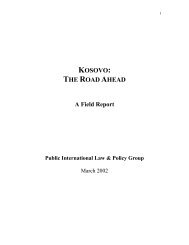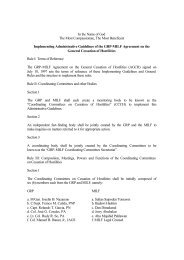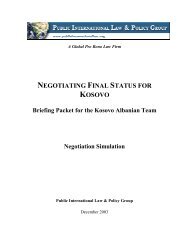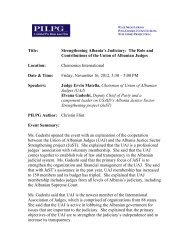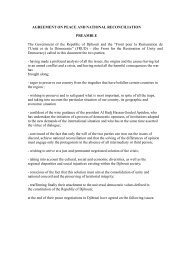Vol. 8 Issue 7 - Public International Law & Policy Group
Vol. 8 Issue 7 - Public International Law & Policy Group
Vol. 8 Issue 7 - Public International Law & Policy Group
You also want an ePaper? Increase the reach of your titles
YUMPU automatically turns print PDFs into web optimized ePapers that Google loves.
Roadside bombs are a key Taliban weapon against government and international forces in an<br />
insurgency that has gained pace since the hardliners were removed from government seven<br />
years ago.<br />
Amnesty for 60 Taliban<br />
Agence France Presse, 2/17/09<br />
The Afghan government announced Tuesday it had given amnesty to nearly 60 Taliban<br />
fighters who had agreed to lay down their weapons, as some of them claimed they were<br />
misled into jihad or "holy war".<br />
The men who received amnesty from the government's Commission for Peace and<br />
Reconciliation were the latest of nearly 7,680 over the past three years to agree to not fight<br />
the government, a commission official said.<br />
It comes after President Hamid Karzai again called last week at a security conference in<br />
Germany for Taliban who are not part of Al-Qaeda to give up the insurgency against his<br />
government, backed by thousands of foreign soldiers.<br />
Most of the men in the latest group covered their faces with large Afghan shawls at a<br />
ceremony at which they handed certificates of amnesty in return for pledges to not fight.<br />
The head of the commission, former Afghan president Sebghatullah Mujaddedi, urged them<br />
to stand by their commitment and not return to the militants, adding that the fighting was<br />
hurting mainly civilians.<br />
"It is the civilians who die every day here in suicide attacks or by government or foreign<br />
forces' bombing," he told the ceremony.<br />
Among the 7,680 who had accepted amnesty were 781 men who had been freed from<br />
detention at US military "war on terror" camps at Bagram in Afghanistan and Guantanamo<br />
Bay in Cuba, said commission official Mohammad Akram Mirhazar.<br />
One of the men at Tuesday's ceremony said he had been a Taliban for four years after being<br />
told by religious circles in Pakistan, where he had lived, that he should fight jihad in<br />
Afghanistan because of the presence of foreign troops.<br />
Qari Shair Wali also alleged that Pakistan's intelligence service was funding militant training<br />
centers in the tribal belt bordering Afghanistan.<br />
Afghans regularly make such allegations against the Inter-Services Intelligence bureau but<br />
they are rejected by the Pakistan government.<br />
Another man, Abdul Ghafar, also said he was misled by religious circles into calling for<br />
jihad.



